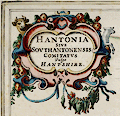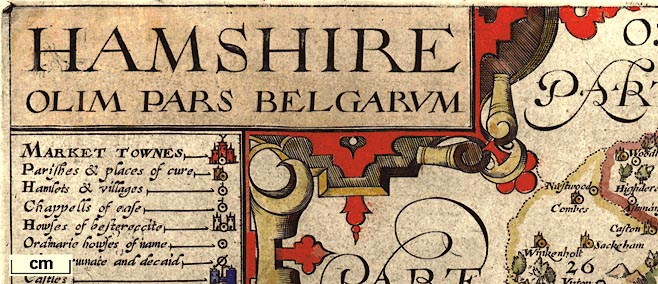
 Map Group NORDEN 1607
Map Group NORDEN 1607









strapwork cartouche

HAMSHIRE / OLIM PARS BELGARVMCamden's work is arranged by the old british tribes; Hampshire was the land of the Belgae.
compass rose
Jo: Norden descripsit WHole sculp

The cardinal, half cardinal, and false points of the compass are indicated, north is marked with a fleur de lys. The cardinal points are named:-
SEPTSeptentriones: refering to the seven stars that make up the constellation of The Bear, or Plough, that is a pointer for the Pole Star in the North
ORIOriens: from the Latin orior, to rise, where the sun rises in the East
MERIMeridiens: middle of the day, where the sun is then in the South
OCCIOccidens: from the Latin occido, to fall or set, where the sun sets in the West
scale
old english mile

The scale line of 10 miles is chequered in half miles. The 10 miles = 66.4 mm, giving a scale 1 to 243300, on the bad assumption of a modern statute mile. The map scale is about:-
1 to 240000
4 miles to 1 inchAn estimate of scale can be made from town positions, comparing known town-town distances, using DISTAB.exe. The map scale is about:-
1 to 380000
6 miles to 1 inchThe map maker's mile is an:-
Old English Mile = 1.24 statute miles

bottom left SY907888
top left SU036781
top right TQ015639
bottom right SZ886747

MARKET TOWNES [dot, circle, buildings]
Parishes & places of cure [dot, circle, tower or building]
Hamlets & villages [dot, circle, a short vertical line]
Chappels of ease [dot, circle, half cross]
ie a short vertical line, with a horizontal line to one side
Howses of bestericcite [dot, circle, tower either side]
Ordinarie howses of name [dot, circle]
Places ruinate and decaid [dot, circle, cancelled by a slash]
Castles [two towers with a flag]
Old trenches and fortes [hatched circle, and flag]
Monasticall places [dot, circle, and cross]
Beacons or beaukens [posts on a hill]Norden's manuscript for the map is in the British Library, part of AddMSS 31.835:-
A Chorographical Description of the severall Shires and islands of Middlesex, Essex, Surrey, Sussex, Hampshire, Weighte, Gurnesey and Jersey, performed by the traveyle and view of John Norden, 1595His original list of symbols included:-
... Howses of best receite, Ordinarie howses of means, ... Old trenches and fortes, ... Woody Places, Devision for Hundreds, Rivers, Bridges, and ParkesThe 1607 edition is slightly different.
sea pecked
sea monsters
ships

coast shaded

The coast line is shaded.
castles
Hurst castle
Calshot cast
Netley cast
St: Androw cast
Ruynes of Haselworth castle
South cast

bridges

Braiding might be suggested, for example south of Stockbridge. The rivers that are shown can mostly be indentified, and include the major rivers of the county. Bits of some streams look as if they have been detached and joined to others?
A few bridges are marked. For example at Fordingbridge.

The river system at Winchester is more complicated:-

and the stream emerge from the city walls.
hillocks

which are grouped in various ways.
Selborne beak [SU2500]
Toothillbeac [SU3818]
3 Parow beacons [SU5044 = Three Barrows]

The other beacons shown are:-
W of Hythe [SU3703]
W of Pitt [SU4230]
WNW of Boteley [SU4712]
SW of Burghclere [SU4758]
NW of Extone [SU5723]
W of Farlington [SU6504]
SE of Bramshott [SU8754]
This map was drafted in 1595, only a few years after the Armada, whose presence off our shores was signalled by beacons. Norden must have been aware how important beacons were for defensive communication. The number of posts is always three; though on other maps the number varies and is thought to show how many beacons there were in a sophisticated system.
forests
trees

A number of these are labelled, eg:-
New Forrest
Forrest of Bearewhich is East Bere Forest
Weste Forrestwhich is West Bere Forest
One single tree is named, the:-
Lomer Ash

Most parks can be identified, and some are lebelled, eg:-
Fremantle pk
Barne pkwhich is Beaurepaire Park
swash lettering
Swash lettering is used to fill space outside Hampshire, naming the adjacent counties. Eg:-
PARTE OF WILTSHIRE
table of hundreds

The hundred boundaries are shown by dotted lines, and the areas numbered to a key at the side of the map. Beware that some hundreds have detached parts. The key is just a list, eg:-
HUNDREDES
Crundall hundred -- 1
Odiam -- -- -- -- - 2
Alton -- -- -- -- - 3
Norden has put Bosmere over the top of what is now Bermondspit. Bosmere, today, is Hayling Island which has no number on the map, plus part of Portsdown.
Norden has 13 on the map where it should be 31 in central Hampshire.
Someone has coloured the hundred boundaries on this copy of the map, opinion is that this is comparatively recent, wrongly in places - be careful how you follow the lines.
Further notes:-
see:- NRD1HUN.txt

Town walls and towers can be seen around Winchester, as also Portsmouth and Southampton.




of best reception, and:-

an ordinary house.

windmills

A post mill is drawn at Clanfield.
hillforts
Old trenches and fortes

This is a hatched circle much like the tumulus symbol commonly used today, plus a flag. Some of the sites are named, eg:-
Butserhill
Dunbury hillOther sites can be identified, eg:- Bury Hill site, Hengistbury Head site, Beacon Hill site at Burghclere, etc.
roman towns

Some roman sites are named, for example:-
Venta
Vindonum
Clausentum

Monastical places, a cross on a place mark.

Chapels of ease, half a cross on a place mark.
Alomechine Copperas house
Bascombe Copperas house



Norden's manuscript map is in the British Library, part of AddMSS 31.835.
The original drawing was engraved around this time and possibly published but is only known from later states published by Stent and by Overton; see Norden 1595.
Published in 'Britain, Or A Chorographicall Description of the most flourishing Kingdomes, England, Scotland, and Ireland, and the Ilands adioyning, out of the depth of Antiquitie: Beautified with mappes of the severall Shires of England: Written first in Latine by William Camden ... Translated newly into English by Philemon Holland ... Finally, revised, amended, and enlarged with sundry Additions by the said Author. Londini. Impensis Georgii Bishop & Ioannis Norton, M.DC.X.' ie 1610.
Published in 'Britain or a chorographicall description of England ... translated ... by P. Holland ... London. Printed by F. K. R. Y. and I. L. for Andrew Heb, 1637.'


NB. They are not directly related to the map of the same date but had not been allocated their own Map Group.
The Surveyors Dialogue. Divided into five Bookes. Very profitable for all men to peruse, that have to do with the revenues of Land, or the manurance, use, or occupation thereof. both Lords and Tenants: as also and especially for such as indevor to be seene in the faculty of surveying of Mannors, Lands, Tenements, &c. By I.N.
PROV. 17.2. A discreet servant shall have rule over an unthrifty sonne, and he shall divide the heritage among the brethren.
Voluntas pro facultate.
LONDON, Printed for Hugh Astley, dwelling at S. Magnus corner. 1607.
The Contents of the five books of the Surveyors Dialogue.
THe first Booke containeth a communication betweene a Farmer and a Surveyor of land: wherein is proved, that Surveyors of Mannors and land, are necessarie both for the Lord and Tennant, and in what maner tenants ought to behave themselves towards their Lords, in respect of their tenures.
In the second Booke, is intreated between the Lord of a Mannor, and a Surveyor, concerning the estate of a Mannor, of the parts and profits thereunto belonging, & how the Lord of a Mannor ought to deale with his Tenants.
In the third Booke is contained the maner and method of keeping a Court of Survey, and the Articles to be inquired of, and the charge how to enter & inroll Copies, Leases and Deeds, and how to take the plot of a Mannor.
In the fourth Booke is shewed the maner of the Casting up of the qua~tities of acres of alsorts of grounds by the scale and compasse, with Tables of computation for ease in accompting.
In the fifth Booke is shewed the different natures of grounds, and whereunto they mmay be best imployed, how they may be bettered, reformed and amended, fit for all Farmers and husbandmen.


Norgate, Martin & Norgate, Jean: 1997: Notes from Norden's Map of Hampshire: Hampshire County Council Museums Service:: ISBN 1 85975 131 8











